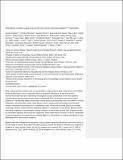Osteoblasts remotely supply lung tumors with cancer-promoting SiglecF
Author(s)
Rickelt, Steffen; Hynes, Richard O
DownloadMs_v13 + ROH edits.pdf (868.3Kb)
OPEN_ACCESS_POLICY
Open Access Policy
Creative Commons Attribution-Noncommercial-Share Alike
Terms of use
Metadata
Show full item recordAbstract
Bone has a well-established role in advanced cancer. It provides a supportive microenvironment for the growth of metastatic cells that escape the primary tumor, which ultimately leads to loss of bone mass. Engblom et al. show that bone may also contribute to early-stage tumorigenesis through a mechanism that leads to an increase in bone mass (see the Perspective by Zhang and Lyden). In mouse models of lung adenocarcinoma, primary tumor cells remotely activated bone-resident cells called osteoblasts, which have a bone-building function. The activated osteoblasts in turn triggered production of a certain type of neutrophil that infiltrates the primary tumor and promotes its growth. Patients with early-stage lung cancer were also found to have an increase in bone density, consistent with the findings in mice.
Date issued
2017-12Department
Massachusetts Institute of Technology. Department of Biology; Koch Institute for Integrative Cancer Research at MITJournal
Science
Publisher
American Association for the Advancement of Science (AAAS)
Citation
Engblom, Camilla, et al. “Osteoblasts Remotely Supply Lung Tumors with Cancer-Promoting SiglecF High Neutrophils.” Science, vol. 358, no. 6367, Dec. 2017, p. eaal5081.
Version: Author's final manuscript
ISSN
0036-8075
1095-9203